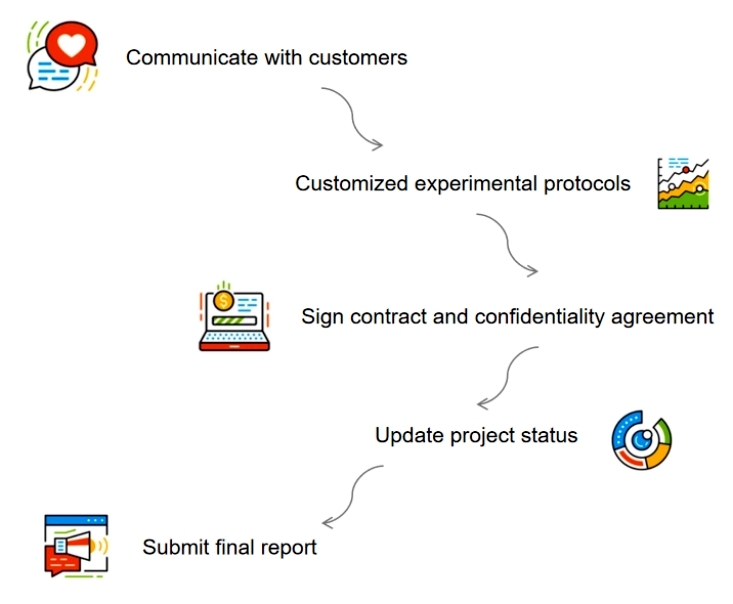Post-translational modification (PTM) of Protein Biopharmaceuticals represents a pivotal realm in the pharmaceutical landscape, converging biology and precision medicine. These modifications, occurring after protein synthesis, exert profound influences on the structure, function, and pharmacokinetics of biopharmaceuticals. The intricate orchestration of PTMs opens avenues for tailored therapeutic interventions, necessitating advanced analytical methodologies for a nuanced understanding.
Creative Proteomics has extensive experience in post-translational modification of protein biopharmaceuticals research. Based on our advanced technology platform and professional research team, we continue to help researchers deepen their understanding of the biopharmaceutical process, ensure scientific reliability and practicality, and provide substantial contributions to the advancement of the biopharmaceutical field.
Explore Our Specific Services
Analytical Methods for PTM Characterization
- Mass Spectrometry (MS). Mass spectrometry stands at the forefront of PTM characterization, offering unparalleled precision in elucidating modifications. Tandem MS techniques, such as ESI-MS and MALDI-MS, enable the identification and quantification of diverse PTMs. High-resolution MS facilitates the mapping of modification sites, unraveling the molecular intricacies of protein biopharmaceuticals.
- Chromatographic Techniques. Liquid chromatography (LC) and gas chromatography (GC) are indispensable tools for PTM analysis. LC coupled with MS enables the separation and identification of modified peptides, while GC is employed for volatile PTM products. Chromatographic techniques provide a comprehensive view of the PTM landscape, enhancing the quality control of biopharmaceuticals.
- NMR Spectroscopy. Nuclear Magnetic Resonance (NMR) spectroscopy plays a pivotal role in deciphering dynamic PTMs. It provides insights into conformational changes induced by modifications, elucidating the structural consequences on protein biopharmaceuticals. NMR, in conjunction with other techniques, contributes to a holistic understanding of PTM-associated alterations.
Applications of PTM in Protein Biopharmaceuticals
- Enhanced Therapeutic Efficacy. PTMs enable the fine-tuning of biopharmaceuticals, optimizing their therapeutic efficacy. Glycosylation, phosphorylation, and acetylation can modulate pharmacokinetics, bioavailability, and immunogenicity, enhancing the overall clinical performance of protein therapeutics.
- Targeted Drug Delivery. Site-specific PTMs empower the design of biopharmaceuticals for targeted drug delivery. Precision modifications facilitate selective interactions with cellular receptors, improving the specificity of therapeutic interventions. This targeted approach minimizes off-target effects and enhances the therapeutic index.
- Immunogenicity Management. PTMs play a crucial role in mitigating immunogenic responses to biopharmaceuticals. Rational modification strategies can attenuate immunogenicity, ensuring prolonged therapeutic benefits and reducing the risk of adverse reactions. PTM-informed immunogenicity management is paramount for the long-term success of protein-based therapeutics.
Analytic Significance of PTM in Protein Biopharmaceuticals
- Quality Assurance. Precise characterization of PTMs is fundamental to ensuring the quality and consistency of protein biopharmaceuticals. Analytical methods contribute to the identification of critical modifications, enabling stringent quality control measures throughout the manufacturing process.
- Regulatory Compliance. The pharmaceutical industry is governed by rigorous regulatory standards. Comprehensive PTM analysis aligns with regulatory expectations, facilitating compliance with global pharmaceutical guidelines. Accurate documentation of PTMs is imperative for regulatory submissions and approvals.
- Biomarker Discovery. PTM profiling serves as a rich source for biomarker discovery in various diseases. Altered PTM patterns can be indicative of pathological conditions, offering insights into disease progression and aiding in the development of personalized therapeutic strategies.
Our Service Workflow

The exploration of Post-Translational Modification in Protein Biopharmaceuticals unveils a molecular landscape of unparalleled complexity. Advanced analytical methodologies not only decipher the intricacies of PTMs but also pave the way for the development of next-generation biopharmaceuticals with enhanced precision and therapeutic efficacy. The convergence of biology and analytical sciences propels the pharmaceutical industry toward a future where tailored therapeutic interventions are guided by molecular precision. Creative Proteomics has rich experience in post-translational modification of protein biopharmaceuticals research, if you are interested in us, please feel free to contact us, we look forward to working with you.
Our products and services are for research use only.

